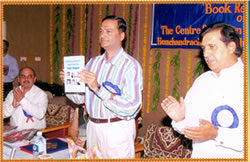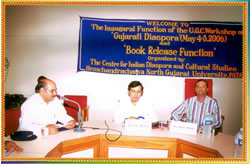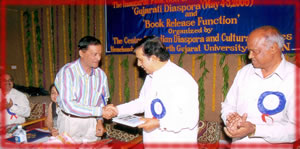|
 Seminar
Organized
: International Seminar on Seminar
Organized
: International Seminar on
“Gujarati
Diaspora"
May
4-5, 2006
As everyone knows the Gujarati Diaspora is an important constituent of the great Indian Diaspora. The Non Resident Gujaratis are settled in Countries as diverse as USA, UK, New Zealand, South Africa, Uganda, Kenya, Tanzania, Australia, Fiji and the Gulf. They are an important component of their host countries providing yeoman service in sectors as diverse as retailing, hospitality industry (Hotels and Motels), Medicine, Engineering and IT industry. Even they have risen through the political ladder of the host countries like most other Indian Diasporic communities. Lord Dholakia, the leader of the Liberal Democratic Party in Britain testifies to the success of the Gujarati Diaspora. In the intellectual field thinkers like Lord Bhiku Parekh prove the success of the Gujarati Diaspora. From being small motel owners and retail shop owners the non-resident Gujaratis have moved on to big business in their host countries. The resilience of the Gujarati Diaspora is evident from the fact that even after facing total ruin during the regime of Idi Amin in Uganda the Gujarati diaspora has resurfaced there and is financially well settled. Kenya, Tanzania, Australia, Fiji and the Gulf. They are an important component of their host countries providing yeoman service in sectors as diverse as retailing, hospitality industry (Hotels and Motels), Medicine, Engineering and IT industry. Even they have risen through the political ladder of the host countries like most other Indian Diasporic communities. Lord Dholakia, the leader of the Liberal Democratic Party in Britain testifies to the success of the Gujarati Diaspora. In the intellectual field thinkers like Lord Bhiku Parekh prove the success of the Gujarati Diaspora. From being small motel owners and retail shop owners the non-resident Gujaratis have moved on to big business in their host countries. The resilience of the Gujarati Diaspora is evident from the fact that even after facing total ruin during the regime of Idi Amin in Uganda the Gujarati diaspora has resurfaced there and is financially well settled.
One important characteristic of the Gujarati diaspora is that it wants to retain its connectivity to its motherland. This is manifest in the desire of the Gujarati diaspora to invest in Gujarat in the field of
 social sector. The non-resident Gujaratis have been very active in establishing Hospitals, schools and colleges in Gujarat. The non-resident Gujaratis were quick to come to the aid of Gujarat during the terrible earthquake of the year 2001. Non-resident Gujaratis have also successfully lobbied in the western capitals for foreign direct investment in Gujarat. They have also been at the forefront in getting the latest technological innovations to India. Even in the religious and cultural field the Gujarati diaspora has been very active. For instance the largest Hindu temple of the world has been constructed by the Swaminarayan sect in London with major contributions from the Gujaratis settled there. social sector. The non-resident Gujaratis have been very active in establishing Hospitals, schools and colleges in Gujarat. The non-resident Gujaratis were quick to come to the aid of Gujarat during the terrible earthquake of the year 2001. Non-resident Gujaratis have also successfully lobbied in the western capitals for foreign direct investment in Gujarat. They have also been at the forefront in getting the latest technological innovations to India. Even in the religious and cultural field the Gujarati diaspora has been very active. For instance the largest Hindu temple of the world has been constructed by the Swaminarayan sect in London with major contributions from the Gujaratis settled there.
 When there is such a vast potential and pool of talent in the Gujarati diaspora it is in our national
interest to tap the potential of the Gujarati diaspora and utilize its strength for furthering our global interest. In order to forge a close relationship with the Gujarati diaspora it is reasonable to study with academic rigour and discipline the socio-cultural-economic and historical background of the Gujarati diaspora. Such a study will further strengthen Gujarati Diaspora's emotional bonds and socio-economic and cultural ties with their motherland. The workshop intends to make a sincere effort in this direction by focusing on the following issues: When there is such a vast potential and pool of talent in the Gujarati diaspora it is in our national
interest to tap the potential of the Gujarati diaspora and utilize its strength for furthering our global interest. In order to forge a close relationship with the Gujarati diaspora it is reasonable to study with academic rigour and discipline the socio-cultural-economic and historical background of the Gujarati diaspora. Such a study will further strengthen Gujarati Diaspora's emotional bonds and socio-economic and cultural ties with their motherland. The workshop intends to make a sincere effort in this direction by focusing on the following issues:
-
socio-cultural, economic and political background of Gujarati Diaspora,
-
dynamics of Socio-political and cultural transformation of Gujarati Diaspora - the process of assimilation/ non-assimilation integrations and distinctiveness,
-
interface between Gujarati Diaspora and host-communities; studying the structure and dimensions of their relationship,
-
nature and patterns of migration from Gujarat,
-
studying various castes/ communities and organizations and their contributions to the upliftment of their motherland,
-
dialectics of ethnic, regional, national, and linguistics identities of Gujarati Diaspora,
-
globalism, Transnationalism and Gujarati Diaspora.
-
contribution of Indian Diaspora in building up pressure group and lobbying for India's effective political voice and visibility in the international politics,
-
Gujarati Diaspora's contributions to the growth of the Indian economy and development of Gujarat; remittances and investments,
-
Gujarati Diaspora's contributions to educations, science and technology, IT, health care, tourism and social welfare,
-
representation of Gujarati/ Indian Diaspora in literature, art and films, and
-
the role of the Area Study Centre in studying, conceptualizing and theorizing the issues related to Gujarati/ Indian Diaspora for the State and Central governments to formulate policies on the same.
Dr. Adesh Pal
Coordinator

|